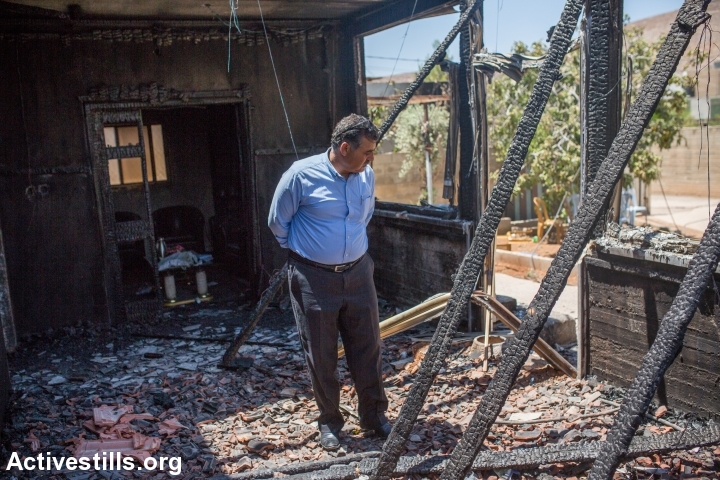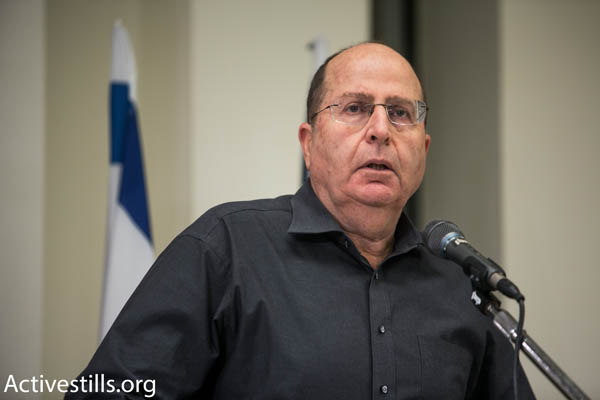Israel’s defense minister says he knows who is responsible for burning an entire family alive, but that charging them in court isn’t the state’s top priority.
Prime Minister Benjamin Netanyahu has vowed at least a handful of times to do everything in his power to bring the murders of the Dawabsha family to justice. His defense minister, Moshe Ya’alon, on Wednesday hinted that the state’s priorities may have shifted — or that it may have a different definition of justice.
“The security agencies know who is responsible for the [Duma arson attack] but are abstaining from putting them on trial in order to not expose intelligence sources in court,” Haaretz reported on Thursday, citing a talk Ya’alon gave to young Likud activists. (My translation of the original Hebrew.)
The report offers very few clarifications and there is a sweeping gag order on the entire investigation, but we can draw a number of possible conclusions from Ya’alon’s seemingly deliberate leak.
In the days following the Duma attack that killed three members of the Dawabsha family, Israeli authorities announced they had put three alleged Jewish extremists, two of whom are U.S. citizens, into administrative detention (a tool for imprisoning somebody without trial). The state has never, however, publicly connected those three men to the Duma murders.
One of the three is said to be a suspect in an unrelated arson of a church, and in briefings with journalists, the Shin Bet painted a second man as a ringleader of sorts without making any direct connections to the violence.
(I asked the State Department to comment on the administrative detention of U.S. citizens at the time. I received the following response from a spokesperson for the Bureau of Consular Affairs that I didn’t deem worthy of publication at the time: “We have seen the reports that a U.S. citizen is being detained in Israel. We take our obligation to assist U.S. citizens detained overseas seriously. We stand ready to provide all possible consular assistance. Due to privacy considerations, we have no further comment.”)
So we do not know if the three men being held without charge or trial are in fact suspects in the Duma murders. If they are, however, we can presume that Ya’alon was referring to them and the decision not to put them on trial.

When it comes to violent settlers, Israeli law enforcement is notorious for relying more on intelligence collections methods and less on traditional police work. That results in two things: the evidence they collect is often not admissible in civilian court; or authorities are hesitant to reveal their sources in open court at all, so they skip the judicial process entirely.
The problem with choosing administrative detention over a public trial is that it delays — and often denies — justice for the victims, and creates a new injustice as a result. If there is no trial and conviction, the Dawabsha family will never get even a modicum of closure in their unimaginable tragedy. They will not see justice.
If the murderers of the Dawabsha family are known to Israeli authorities but not indicted and tried, it will show that the Israeli government values its “intelligence sources” more than justice.
This case, however, is even more insidious than that. In deciding to use undemocratic tools such as administrative detention — most commonly used against Palestinians — against what the government has termed “Jewish terrorism,” Israeli authorities chose to launch an assault on civil rights in the name of equality. The thing is, a huge gap still remains between the measures Israel is willing to employ against Palestinian terrorism suspects and Jewish ones.
When Israel wants a conviction against Palestinians and doesn’t want to reveal its intelligence sources, authorities have other tools available to them. The state could, for instance, try the Duma suspects in military courts where there is no codified presumption of innocence and only fraction of a percent of defendants are ever acquitted.
Read: Saying goodbye to Reham Dawabsha
Another tactic used by Israeli authorities when they don’t want to reveal their sources in court is to submit secret evidence, which is inherently impossible to defend yourself against. It is extremely rare, if it has happened at all in recent years, that an Israeli judge rules against secret evidence presented by the security establishment.

Even more extreme were the curfews and closures and mass roundups the Israeli army carried out following the murder of the Fogel family, a series of steps that eradicated whatever line once separated investigation and collective punishment.
Of course, neither none of those are solutions here. Jewish terrorism suspects should not be treated like Palestinian terrorism suspects; the civil rights of all suspects should be held to an even higher standard, and adjudicating justice in open court should always be the highest priority.
If the Israeli security services do indeed know who is responsible for the murders of Reham, Ali and Sa’ad Dawabsha, they should be arrested and convicted in a court of law. Anything less would show that justice is not the government’s priority.



